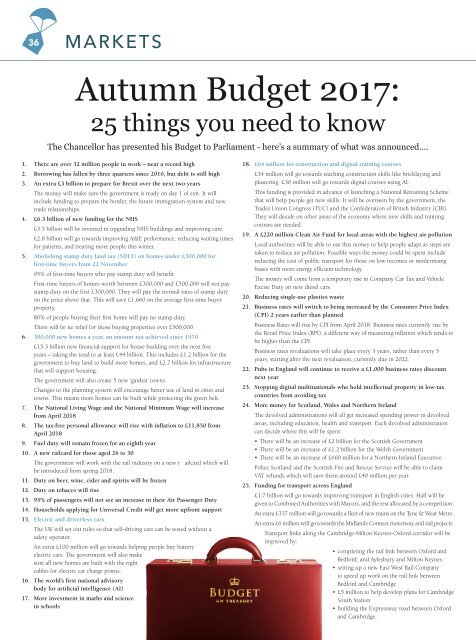Property Drop Issue 16
You also want an ePaper? Increase the reach of your titles
YUMPU automatically turns print PDFs into web optimized ePapers that Google loves.
36 MARKETS<br />
Autumn Budget 2017:<br />
25 things you need to know<br />
The Chancellor has presented his Budget to Parliament - here’s a summary of what was announced….<br />
1. There are over 32 million people in work – near a record high<br />
2. Borrowing has fallen by three quarters since 2010, but debt is still high<br />
3. An extra £3 billion to prepare for Brexit over the next two years<br />
The money will make sure the government is ready on day 1 of exit. It will<br />
include funding to prepare the border, the future immigration system and new<br />
trade relationships.<br />
4. £6.3 billion of new funding for the NHS<br />
£3.5 billion will be invested in upgrading NHS buildings and improving care.<br />
£2.8 billion will go towards improving A&E performance, reducing waiting times<br />
for patients, and treating more people this winter.<br />
5. Abolishing stamp duty land tax (SDLT) on homes under £300,000 for<br />
first-time buyers from 22 November<br />
95% of first-time buyers who pay stamp duty will benefit.<br />
First-time buyers of homes worth between £300,000 and £500,000 will not pay<br />
stamp duty on the first £300,000. They will pay the normal rates of stamp duty<br />
on the price above that. This will save £1,660on the average first-time buyer<br />
property.<br />
80% of people buying their first home will pay no stamp duty.<br />
There will be no relief for those buying properties over £500,000.<br />
6. 300,000 new homes a year, an amount not achieved since 1970<br />
£15.3 billion new financial support for house building over the next five<br />
years – taking the total to at least £44 billion. This includes £1.2 billion for the<br />
government to buy land to build more homes, and £2.7 billion for infrastructure<br />
that will support housing.<br />
The government will also create 5 new ‘garden’ towns.<br />
Changes to the planning system will encourage better use of land in cities and<br />
towns. This means more homes can be built while protecting the green belt.<br />
7. The National Living Wage and the National Minimum Wage will increase<br />
from April 2018<br />
8. The tax-free personal allowance will rise with inflation to £11,850 from<br />
April 2018<br />
9. Fuel duty will remain frozen for an eighth year<br />
10. A new railcard for those aged 26 to 30<br />
The government will work with the rail industry on a new r ailcard which will<br />
be introduced from spring 2018.<br />
11. Duty on beer, wine, cider and spirits will be frozen<br />
12. Duty on tobacco will rise<br />
13. 95% of passengers will not see an increase in their Air Passenger Duty<br />
14. Households applying for Universal Credit will get more upfront support<br />
15. Electric and driverless cars<br />
The UK will set out rules so that self-driving cars can be tested without a<br />
safety operator.<br />
An extra £100 million will go towards helping people buy battery<br />
electric cars. The government will also make<br />
sure all new homes are built with the right<br />
cables for electric car charge points.<br />
<strong>16</strong>. The world’s first national advisory<br />
body for artificial intelligence (AI)<br />
17. More investment in maths and science<br />
in schools<br />
18. £64 million for construction and digital training courses<br />
£34 million will go towards teaching construction skills like bricklaying and<br />
plastering. £30 million will go towards digital courses using AI.<br />
This funding is provided in advance of launching a National Retraining Scheme<br />
that will help people get new skills. It will be overseen by the government, the<br />
Trades Union Congress (TUC) and the Confederation of British Industry (CBI).<br />
They will decide on other areas of the economy where new skills and training<br />
courses are needed.<br />
19. A £220 million Clean Air Fund for local areas with the highest air pollution<br />
Local authorities will be able to use this money to help people adapt as steps are<br />
taken to reduce air pollution. Possible ways the money could be spent include<br />
reducing the cost of public transport for those on low incomes or modernising<br />
buses with more energy efficient technology.<br />
The money will come from a temporary rise in Company Car Tax and Vehicle<br />
Excise Duty on new diesel cars.<br />
20. Reducing single-use plastics waste<br />
21. Business rates will switch to being increased by the Consumer Price Index<br />
(CPI) 2 years earlier than planned<br />
Business Rates will rise by CPI from April 2018. Business rates currently rise by<br />
the Retail Price Index (RPI), a different way of measuring inflation which tends to<br />
be higher than the CPI.<br />
Business rates revaluations will take place every 3 years, rather than every 5<br />
years, starting after the next revaluation, currently due in 2022.<br />
22. Pubs in England will continue to receive a £1,000 business rates discount<br />
next year<br />
23. Stopping digital multinationals who hold intellectual property in low-tax<br />
countries from avoiding tax<br />
24. More money for Scotland, Wales and Northern Ireland<br />
The devolved administrations will all get increased spending power in devolved<br />
areas, including education, health and transport. Each devolved administration<br />
can decide where this will be spent:<br />
• There will be an increase of £2 billion for the Scottish Government<br />
• There will be an increase of £1.2 billion for the Welsh Government<br />
• There will be an increase of £660 million for a Northern Ireland Executive<br />
Police Scotland and the Scottish Fire and Rescue Service will be able to claim<br />
VAT refunds which will save them around £40 million per year.<br />
25. Funding for transport across England<br />
£1.7 billion will go towards improving transport in English cities. Half will be<br />
given to Combined Authorities with Mayors, and the rest allocated by a competition.<br />
An extra £337 million will go towards a fleet of new trains on the Tyne & Wear Metro.<br />
An extra £6 million will go towards the Midlands Connect motorway and rail projects.<br />
Transport links along the Cambridge-Milton Keynes-Oxford corridor will be<br />
improved by:<br />
• completing the rail link between Oxford and<br />
Bedford, and Aylesbury and Milton Keynes<br />
• setting up a new East West Rail Company<br />
to speed up work on the rail link between<br />
Bedford and Cambridge<br />
• £5 million to help develop plans for Cambridge<br />
South Station<br />
• building the Expressway road between Oxford<br />
and Cambridge.


















